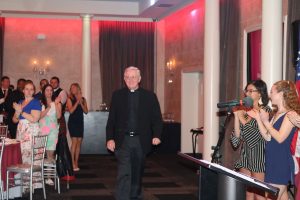Speaker connects race and religion
February 9, 2017
The Catholic Intellectual Tradition Committee at Iona College welcomed Reverend Dr. Bryan Massingale to give a presentation entitled “The Catholic Church and the Movements for Black Lives: Retrieving the Legacy of Gaudium et Spes.”
Guadium et Spes is a document written by the Vatican Council in 1965, according the official Vatican website, and translates to “the joy and hope for the world.” The document says that the faith community has as duty to scrutinizing the signs of the times and interpret them in the light of the gospel, according to Massingale.
He explained that “signs of the times” are powerful events going on in society that elicit a response. Massingale used the Black Lives Matter movement as an example as one of this generation’s signs of the times. He then explained the origin of the phrase “Black Lives Matter” by citing the founder of the organization, Alicia Garza, who said that Black Lives Matter began after George Zimmerman was acquitted of the murder of Trayvon Martin.
“I was sending love notes to black people saying ‘we’re enough, we are enough, and we don’t deserve to die, and we don’t deserve to be shot down in the streets like dogs because someone else is scared of us,’” Garza said, according to Massingale. “Our presence is important, and we matter, and our lives matter, black lives matter.”
Massingale explained the importance of understanding the phrase “Black Lives Matter.”
“Right from the beginning it tells us that Black Lives Matter is not to be understood as an oppositional thing saying that blue lives don’t matter, or other lives don’t matter,” Massingale said. “It began as a particular reaction to the fact that we’re living in a time, and unprecedented time, when the lives of African Americans are being taken by law enforcement at an alarming rate, and with impunity.”
Massingale referred to a Department of Justice investigation of the Baltimore Police Department, where they found a “pervasive pattern of unconstitutional police practices.” Things such as illegal strip searches, or pulling somebody over for no reason were part of the usual practice.
After Black Lives Matter protests in Baltimore, an Archbishop gave a statement urging unity, mutual respect, understanding, open dialogue, and most importantly, non-violence.
The problem with the Catholic Church’s response, according to Massingale, is that there is an “implicit blaming of the victim” and “no reference to or critique of the systemic injustices or disorder that occasion the protests.”
“The Church encourages us to respect legitimate authority but never raises the question, ‘what if the authority is engaging in a morally and legally illegitimate manner?’” Massingale said.
Massingale expressed his feeling that the Catholic Church is not doing as much as it can to address the issue of race relations, and that he does not see the Catholic Church being an affective ally in the Black Lives Matter Movement.
However, he does have some hope, because he believes in the grass roots movements that the Gaudium et Spes document allowed Catholics to take part in. After the document was written, Catholics became major participants in the Civil Rights Movement for the first time. Priests and Nuns marched in Selma, and there was a surge of Catholic involvement in social justice movements around the country, according to Massingale.
Senior Kori Bennet gave the invocation before the presentation. She also asked Reverend Massingale a question at the end of his presentation: “How do you think we as college students can contribute to the Black Lives Matter movement?”
Massingale responded by saying that the Civil Rights Movement was led by young people, and they “mobilized this country without Twitter, Facebook or cell phones.”
“Own your own voice. You are powerful, you have a voice, use it. Create dialogues, and guard your hopefulness,” Massingale said.







